Within the 9th annual Multi-Stakeholder Forum on Science, Technology and Innovation for the SDGs (STI Forum) held from 9 and 10 May 2024 at the UN Headquarters in New-York, the Science and Technological Community Major Group (STC MG), co-chaired by WFEO and the International Science Council (ISC) organized the in-person side event “Better leveraging Science, Technology, Innovation and Engineering for accelerating progress on the Sustainable Development Goals” on 9 May at the Trusteeship Chamber.
This session explored strategies for better leveraging STI across all levels while harnessing its transformative potential. This includes the need for closer collaboration between the scientific, engineering, and technological communities and all stakeholders including societal actors and policy-makers, to co-design science-based solutions for achieving the SDGs.
The session highlighted examples of impactful initiatives that can accelerate achievement while enabling synergies and multiple co-benefits across the different goals under review this year – SDG 1, 2, 13, 16, and 17.
The recording of the Opening is available by clicking on the below image.
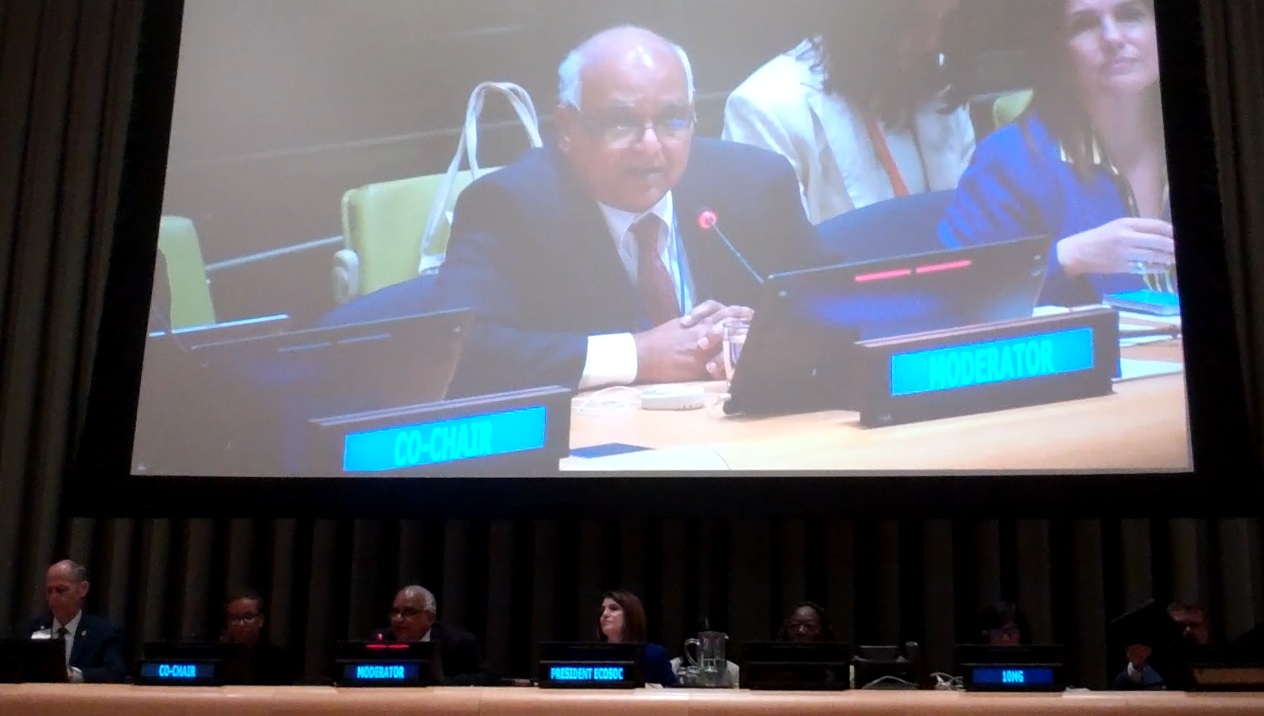
The session was moderated by Dr. K. N. Gunalan, Senior Vice President of AECOM, Co-Chair, Science and Technological Community Major Group (STC MG), and Chair of the WFEO-UN Relations Committee (WURC). The side event was opened by HE Paula Narváez, Ambassador and Permanent Representative of Chile to the UN, President of the UN Economic and Social Council (ECOSOC).
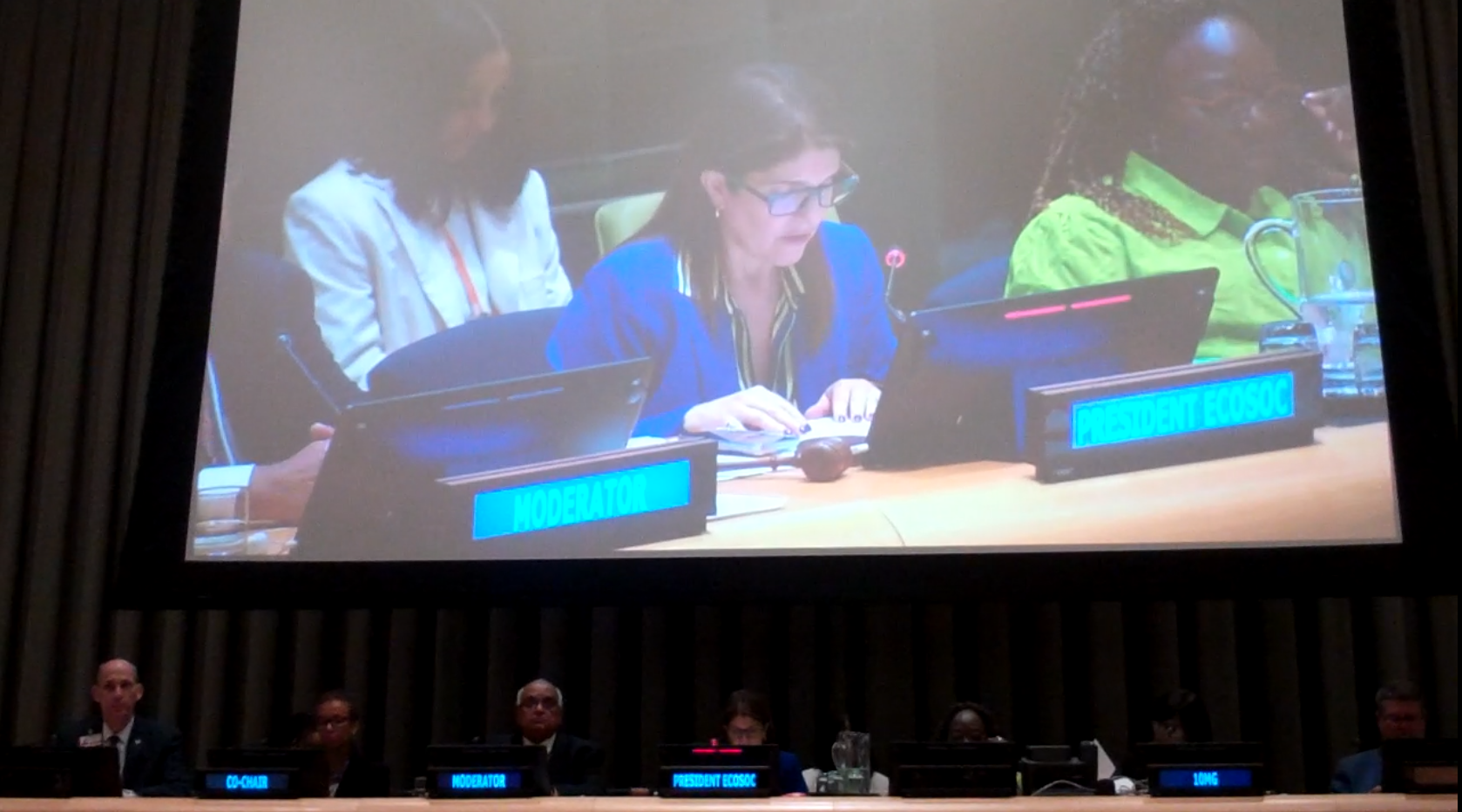
HE Paula Narváez, President of the ECOSOC, opening the Side Event.
HE Inga Rhonda King, Ambassador and Permanent Representative of Saint Vincent and the Grenadines to the UN, Co-Chair of the 2024 STI Forum followed with introductory remarks focused on the need for interdisciplinary research to leverage technologies to address the challenges of climate change.
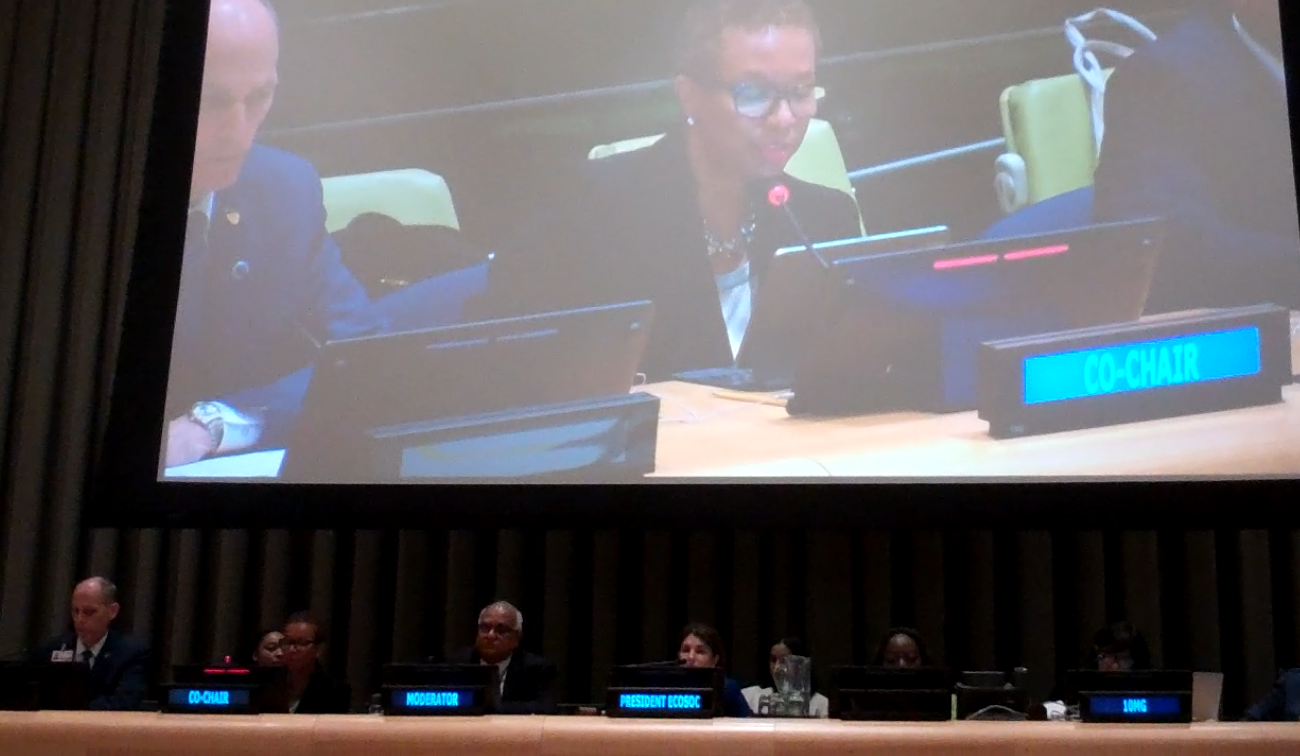
HE Inga Rhonda King, Ambassador and Permanent Representative of Saint Vincent and the Grenadines to the UN,adressing at the Side Event.
Panelists:
Professor Olubukola Oluranti Babalola, Vice-President of the Organization for Women in Science (OWSD) and Vice-President of The World Academy of Sciences (TWAS) who emphasized the need for clarity in communications, the need for more women in the STEM fields, and the need for more collaboration across all science and engineering fields
Dr. Patrick Caron, Vice Chair of the Consultative Group on International Agricultural Research (CGIAR) focused his discussion on the integration of knowledge and action, emphasizing the imperative for engineering and research collaboration. Technology is necessary but not sufficient to achieve the SDGs. He introduced the Montpelier process and closed by emphasizing the need to find a middle ground between technological advancement and sustainable development.
Thomas Smith, Executive Director at the American Society of Civil Engineers (ASCE) outlined ASCE activities that support sustainable civil engineering practice and the SDGs.
These include: National Infrastructure Report Cards, and forward looking engineering standards such as the recently released ASCE/COS 73-23: Standard Practice for Sustainable Infrastructure, which provides guidance for infrastructure owners to develop and implement sustainable solutions throughout a project’s entire life cycle. He concluded by emphasizing the need to better connect science and engineering.
Discussants:
Pulkit Kanotra, is Member of the WFEO Committee on Young Engineers Working Group on Climate Action and civil engineer for Arcadis in NY. He emphasized the critical role young people are playing and can play in combating climate change. He also noted that visible sustainable infrastructure projects like Manhattan’s Big U can inspire young people to consider careers in science and engineering. He presented the FiDi (Financial District) Climate Resilience Plan that he works on at Arcadis and showed how this project is a leading example of how major coastal cities need to prepare for rising sea level in the future.
Dr. Selvaraju Ramasamy, Sr. Officer Science and Innovation, Office of Innovation, Food and Agriculture Organization (FAO). Science, Technology, and Innovation (STI) are critical to agriculture but must include effective technology transfer and appropriate capacity building to support users. Clear communications and support for practical implementation are keys to success.
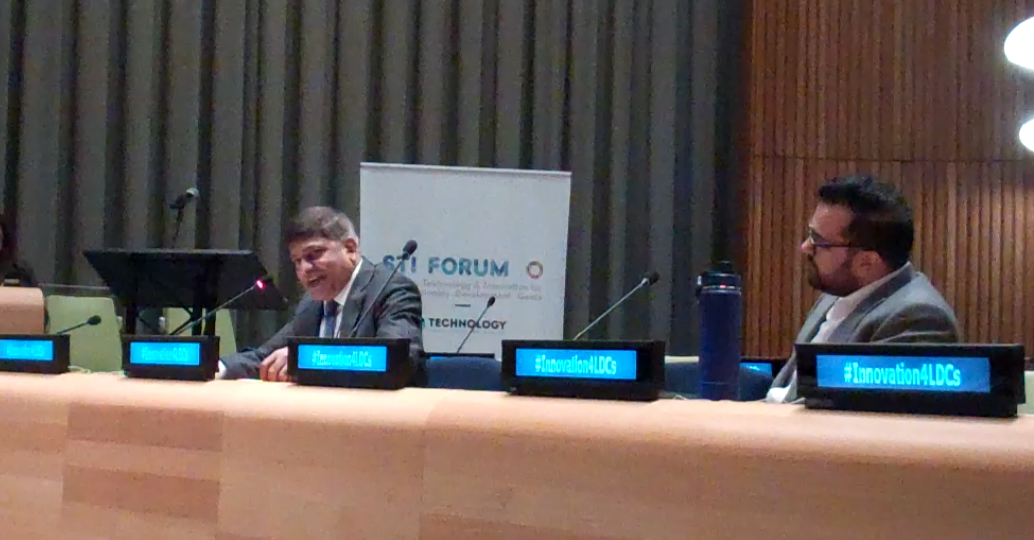
Dr. Selvaraju Ramasamy, Sr. Officer Science and Innovation, Office of Innovation, FAO and Pulkit Kanotra, Member of the WFEO Committee on Young Engineers Working Group on Climate Action
Closing statements:
Prof. Dr. Joyeeta Gupta, University of Amsterdam, and Co-chair of the United Nations 10-Member Group noted the need for a better understanding of the science-policy interface and called for more immediate action to address climate change and especially for more action by the developed countries. She noted that technological solutions can have enormous social and environmental footprints. She said that the information at this side event will be very useful for the report that will come out next year.
Dr. Morgan Seag, ISC Liaison to the UN reemphasizing the pivotal role of scientists, science, engineers, and engineering in progress towards the SDGs. She underscored that the Scientific and Technological Community Major Group (STC MG) can contribute significantly to a more resilient future by supporting Member States and the UN system to leverage scientific and engineering inputs across decision-making and action.
Dr Gunalan closed the session by thanking all of the participants for a very successful and informative session.
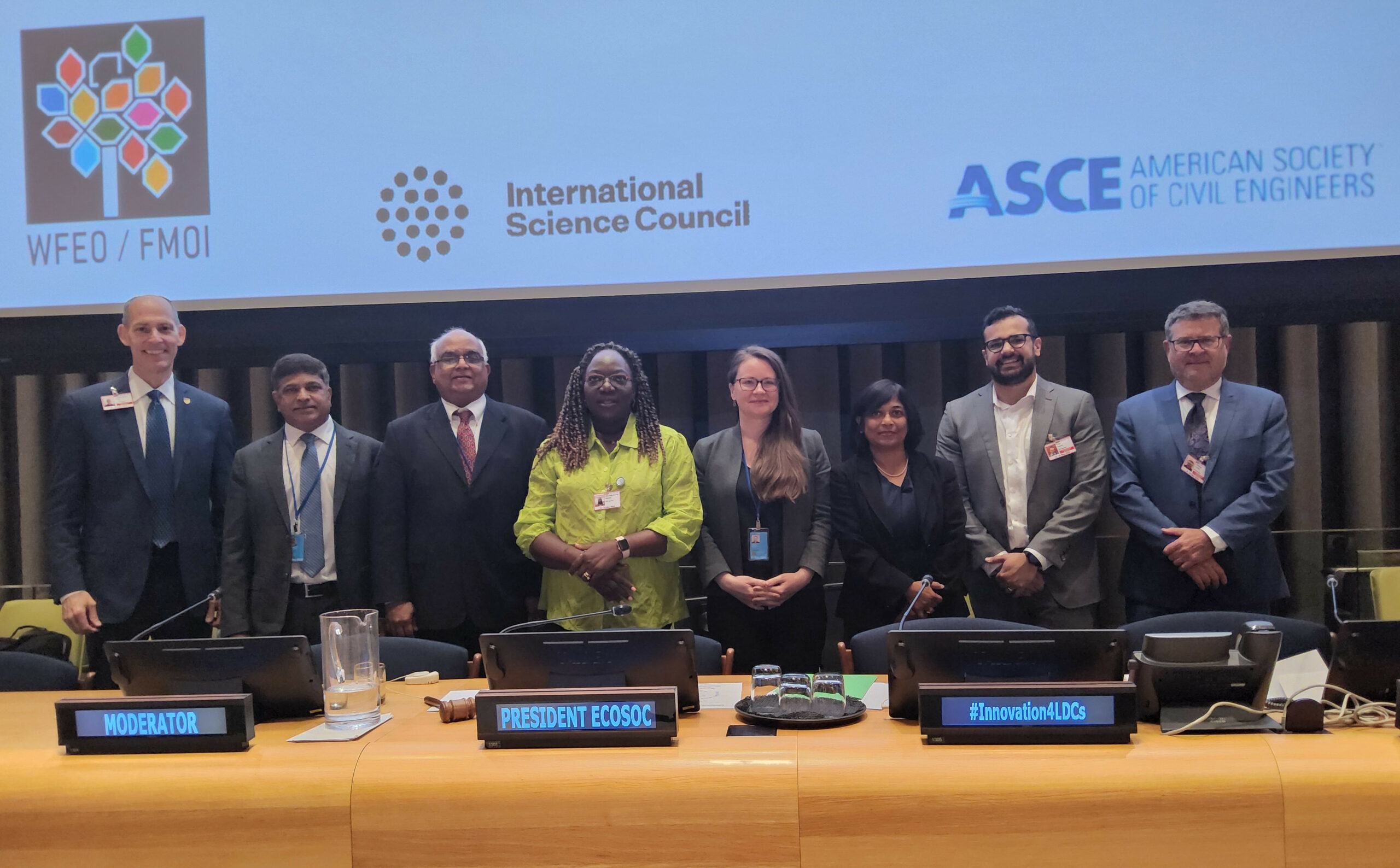
From Left to right: Thomas Smith, Dr. Selvaraju Ramasamy, Dr. K. N. Gunalan, Prof. Olubukola Oluranti Babalola, HE Paula Narváez, Prof. Dr. Joyeeta Gupta, Pulkit Kanotra and Dr. Patrick Caron
After the Side event, ISC invited Dr Gunalan to a “Friends of Science Coalition” luncheon at the Indian Embassy. Lead by India, Belgium, South Africa, Beliz, Switzerland, it was an intimate discussion on how science in all its form can work with member states to accelerate the 2030 agenda. Dr Gunalan emphasized Engineering and assured them that STC MG is ready and able to assist.
Dr Gunalan was also invited to give a speech (available in this link) at the Thematic Session 7: “STI Partnerships for Accelerating Structural Transformation in African Countries, Least Developed Countries and Landlocked Developing Countries“, that was held on 10 May.
Acknowledgements:
Special thanks to the International Science Council Rapporteur Olivia MacDonald, University College London and Dr. Bill Kelly WURC Member and Senior Advisor to ASCE.
For more information:
The programme of the Side Event of the Science and Technological Community Major Group
The programme of all the In-Person Side Events of the STI Forum
JUN
2024

